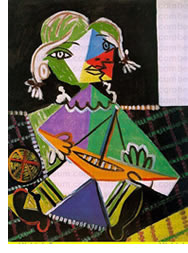 Global
competition, poverty network of the proximity
Global
competition, poverty network of the proximity
and social responsibility
The return of poverty, that id spreading itself
along the banks of the Seine, Po and Duero rivers,
has finally brought Europe to the consciousness
of its delay comparative to the rest of the
world, a delay that it cannot overcome because
its products, as well as its services and machines,
are often obsolete, unreliable and protected
(as well pointed out by the Bolkestein Directive).
Therefore, they are discriminative and unable
to be really competitive in comparison with
those provided by the rest of the world. In
this respect, it is enough to mention the trend
of the technological balance of the Economic
and Monetary Union (EMU), as well as the one
related to the professional movements. The problem
is articulated around the production costs,
the labour productivity and the products, often
expensive, inadequate in terms of quality, insufficient
in terms of quantity and uncompetitive within
the realistic concept of a multiplied normal
value of the product, which is to be linked
to the spending capacity of the end-consumer
within the production process, given the fact
that there is now a single market - the global
one - considerably superior to the standards
of the internal market.
o all these one should add the fact that the
alleged participative decentralisation designed
by the European Charter of Local Self-Government
has not led so far to that internal social dialogue
that could be found at the basis of the co-
administration experiences - developed at their
time in Berlin, Belgrade and then in Moscow
- as the recent events in Paris are significantly
proving. The Paris of today gives one the shivers
when thinking to the values expressed at the
beginning of the Fourth Republic, with ministries
of culture like Malreaux, who saw the human
condition in China as being similar to the "negritude"
- a human and poetical value, part of the French
culture and civilisation - without therefore
being in conflict with other civilisations that
were coordinated with it. Within the information
society, the medieval distances that existed
until the naissance of the knowledge society
no longer subsist, as proven by the UNECE conference
of Tunis, in the sense that all seems to be
teachable to everyone and the solution to be
given to the most various and complex equations
may be discovered in Osaka as well as in Tamanrasset.
But, in the same time, the distance that separates
people in terms of capacity to satisfy their
needs is continuously deepening and two models
of society are now in competition: the purely
capitalistic one, nowadays represented by the
USA - oriented towards the exportation of its
upper class together with its own form of government
- and the one of solidarity - result of the
three monotheistic religions. The Jewish solidarity
is well known from the episode in which Joseph
receives his brothers in Egypt and from the
Evangelic one in which Mark speaks clearly of
unfair richness.
In the same way, The Koran (S.LIX,V.7.), rejecting
the class struggle and the accumulation of richness
by a limited part of the community - as asserted
by dr. Abdul Hadi Gafouri in his "Islam
et économie: Réflexion sur les
principes fondamentaux de l'économie
islamique", Editions Al Bouraq, Beirut-Lebanon,
2000 - recognises the principle of free cooperation
aimed to allow the achievement of the economic
self- sufficiency and independence (pgs. 243
and 244, op. cit., inter alia). The rejection
of violence and of the devastating effects of
terrorism raises today the need to transform
the present network of poverties in a series
of Mediterranean opportunities. The boundaries
to be overcome are two: energetic autonomy and
full occupation of all productive factors, in
an eco-compatible and sustainable way, in order
to insure for this area a real common perspective
of growth towards new forms of prosperity, which
is to be safely shared within the framework
of stability obtained through social dialogue
and participation to the public affairs' management.
Energetic autonomy
The entire Balkan-Mediterranean area, which
is the new "pan-economic European space",
even if rich in energetic raw materials, is
suffering from the endemic monoculture of oil
and gas and of the relative prices, which make
it impossible for the people in the area to
benefit from the energy necessary to the development
of their activities, to the heating of their
homes or simply to their own mobility. Nevertheless,
as long as the main problem of such economic
area is the recovery of the productive activity
and of the dignity of a significant part of
the unemployed population and furthermore, the
bringing of the eco-system back to a relation
of compatibility with the environment, it might
be necessary to initiate an active process of
biomass production, in order to transform it
in bio-diesel - used to produce electric power
in electric power stations of local significance,
that are also parts of a regionally shared electric
system. But the new topic is the desirable creation
of the project financing for micro leasing:
the necessary machines for establishing the
village electric power stations should be rented
by the supplying enterprises, on the basis of
a buy-back agreement, to the public or private
managers of the energetic resources, for a figure
up to 30% of the obtained income, in order to
allow them to face up the long term amortization
of the good. Then, a part of the obtained bio-diesel
should be used as fuel for the agricultural
machines and transportation vehicles, which
are nowadays equipped to use even alimentary
oils as carburant - as it is already well known.